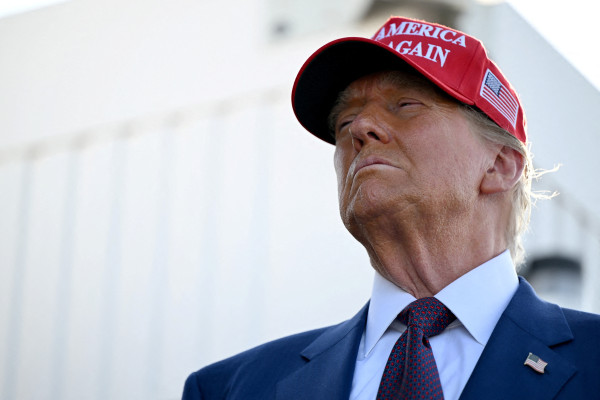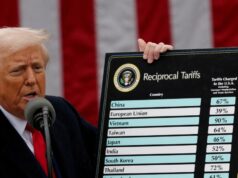Donald Trump’s second presidential term could have huge implications for U.S. trade policy, climate change, the war in Ukraine, electric vehicles, Americans’ taxes and illegal
immigration.
More Tariffs
Trump has floated the idea of a 10% or more tariff on all goods imported into the U.S., a move he says would eliminate the trade deficit. But critics say it would lead to higher prices for American consumers and global economic instability.
He has also said he should have the authority to set higher tariffs on countries that have put tariffs on U.S. imports. He has threatened to impose a 200% tariff on some imported cars, saying he is determined in particular to keep cars from Mexico from coming into the country.
But he has also suggested that allies such as the European Union could see higher duties on their goods.
Trump has targeted China in particular. He proposes phasing out Chinese imports of goods such as electronics, steel and pharmaceuticals over four years. He seeks to prohibit Chinese companies from owning U.S. real estate and infrastructure in the energy and tech sectors.
Mass Deportations
Trump has pledged to limit access to asylum at the U.S.-Mexico border and to embark on the biggest deportation effort in American history, which would likely trigger legal challenges and opposition from Democrats in Congress.
He has said he will employ the National Guard, and, if necessary, federal troops, to achieve his objective, and he has not ruled out setting up internment camps to process people for deportation.
Trump has said he would seek to end automatic citizenship for children born to immigrants, a move that would run against the long-running interpretation of the U.S. Constitution’s 14th Amendment.
He has also suggested he would revoke protected legal status or some populations such as Haitians or Venezuelans.
Trump says he will reinstitute the so-called “travel ban” that restricts entry into the United States of people from a list of largely Muslim-dominant countries, which sparked
multiple legal battles during his first term.
Drilling Away
Trump has vowed to increase U.S. production of fossil fuels by easing the permitting process for drilling on federal land and would encourage new natural gas pipelines. He has said he would reauthorize oil drilling in the Arctic National Wildlife Refuge in Alaska.
Trump has pledged to create a National Energy Council to coordinate policies to boost U.S. energy production. Whether the oil industry follows through and raises production at a time when oil and gas prices are relatively low remains to be seen.
Trump has said he will again pull the United States out of the Paris Climate Accords, and would also roll back Democratic President Joe Biden’s electric-vehicle mandates and other policies aimed at reducing auto emissions.
He has argued that the U.S. needs to be able to boost energy production to be competitive in developing artificial intelligence systems, which consume large amounts of power.
Tax Relief
Trump has promised to slash federal regulations that he says limit job creation. He has pledged to keep in place a broad 2017 tax cut that he signed while in office.
Trump has pledged to reduce the corporate tax rate from 21% to 15% for companies that make their products in the U.S.
He has said he would seek legislation to end the taxation of tips and overtime wages to aid waiters and other service workers. He has pledged not to tax or cut Social Security
benefits.
Trump also has said that as president he would pressure the Federal Reserve to lower interest rates – but would stop short of demanding it.
Diversity Programs
Trump has pledged to require U.S. colleges and universities to “defend American tradition and Western civilization” and to purge them of diversity programs. He said he would direct the Justice Department to pursue civil rights cases against schools that engage in racial discrimination.
At K-12 schools, Trump would support programs allowing parents to use public funds for private or religious instruction. He wants to abolish the federal Department of
Education, and leave states in control of schooling.
Abortion
Trump likely would continue to appoint federal judges who would uphold abortion limits. But he said a federal abortion ban is unnecessary and that the issue should be resolved at the state level. He has argued that a six-week ban favored by some Republicans is overly harsh and that any legislation should include exceptions for rape, incest and the health of the mother.
He may not seek to limit access to the abortion drug mifepristone after the U.S. Supreme Court rejected a challenge to the government’s approach to regulating it. He supports policies that advance in vitro fertilization (IVF), birth control and prenatal care.
Push To End Wars
He has suggested Ukraine may have to yield some of its territory if a peace deal is to be struck, an idea Ukraine has consistently rejected.
Trump’s pick for his national security adviser, U.S. Representative Michael Waltz, was critical of the Biden administration’s decision in November to allow Ukraine to use
U.S.-provided missiles to strike within Russian territory.
Trump has also said that under his presidency the U.S. would fundamentally rethink “NATO’s purpose and NATO’s mission.”
Trump has backed Israel in its fight against Hamas in Gaza but has urged it to wrap up its offensive. He is expected to continue arming Israel. He may seek normalization of ties between Israel and Saudi Arabia.
Trump has also floated sending armed forces into Mexico to battle drug cartels and using the U.S. Navy to form a blockade of that country.
Foes And Allies
Trump has pledged at times to use federal law enforcement agencies to investigate his political foes, including election officials, lawyers and party donors. His choice for attorney general Matt Gaetz is apparently sympathetic to Trump’s revenge agenda.
Along that line, Trump has said he will consider appointing a special prosecutor to probe Biden and may sack a US attorney who did not follow his directives.
Trump has said he will consider pardoning all of those who have been convicted of crimes in connection with the Jan. 6, 2021, attack on the U.S. Capitol.
Federal Bureaucracy
Trump would seek to decimate what he terms the “deep state” – career federal employees he says are clandestinely pursuing their own agendas – through an executive order that would reclassify thousands of workers to enable them to be fired.
He has said he will set up an independent government efficiency panel to root out waste in the federal government. The government already has watchdogs such as the Office of Management and Budget, and investigators general at federal agencies.
Trump would crack down on federal whistleblowers, who are typically shielded by law, and would institute an independent body to “monitor” U.S. intelligence agencies.
With Reuters Inputs
Thirty eight years in journalism, widely travelled, history buff with a preference for Old Monk Rum. Current interest/focus spans China, Technology and Trade. Recent reads: Steven Colls Directorate S and Alexander Frater's Chasing the Monsoon. Netflix/Prime video junkie. Loves animal videos on Facebook. Reluctant tweeter.





